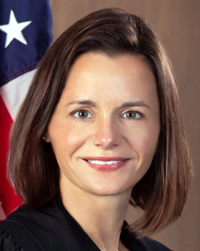
LeGrow
DOVER, Del. - A Delaware judge was wrong to allow expert testimony claiming Zantac causes cancer, the state Supreme Court has ruled in a decision that jeopardizes tens of thousands of lawsuits.
Judge Vivian Medinilla said last year it was up to jurors to sift through opposing opinions concerning a shaky theory that ranitidine in the heartburn medicine can turn into cancer-causing NDMA. Those claims were kickstarted by an independent lab later criticized by the federal Food and Drug Administration.
On July 10, the Supreme Court, in an opinion written by Justice Abigail LeGrow, wrote Delaware's gatekeeping rules for judges mirror federal standards that led a Florida federal judge to toss about 50,000 lawsuits in 2022.
Once that happened, Delaware became a hot spot for lawyers who had initiated an advertising blitz to find clients. The Supreme Court's ruling is a major setback for them, finding the experts did not rely on scientifically accepted research.
"The Superior Court did not address these gaps nor discuss why it was appropriate for the experts to opine that ranitidine causes cancer when the research on which these experts relied did not examine NDMA exposure from ranitidine or establish that the exposure to NDMA in the occupational and dietary studies could be scientifically linked to the exposure to NDMA caused by ingesting ranitidine," LeGrow wrote.
"Further, none of the experts explained their reliance on non-ranitidine studies rather than the ranitidine studies, which showed no increased cancer risk."
Valisure LLC created headlines and lawsuits in 2019 when it claimed its testing showed the Zantac and its generic equivalents contained ranitidine that changed to NDMA. Lawyers cited its study in ensuing litigation, calling Valisure an "independent" lab.
Valisure had brought its findings in a citizen petition to the FDA, which ordered a short-lived recall. The FDA said Valisure's methods were unreliable, saying the lab's "artificial stomach" was heated to 260 degrees and subjected to lethal levels of salt to create NDMA from Zantac.
Valisure detected no NDMA in the drug when testing it under normal human conditions. That didn't stop lawyers who, after the Florida ruling tossing their experts, found more favorable courts in Delaware and California.
In Los Angeles, a Zantac case against Boehringer Ingelheim ended in mistrial. In Chicago, both a trial judge and appeals court have ruled against a woman blaming Zantac for her cancer.
Lawyers at Wisner Baum and other firms had higher hopes for Delaware, where some 75,000 cases are consolidated. But Judge Medinilla was wrong in her analysis of their experts, the Supreme Court decided, especially on the issue of causation.
"The court concluded that the experts could base their conclusions on studies regarding the alleged disease-causing agent rather than the product at issue in the case, without establishing a reliable bridge between the product at issue and the scientific data regarding the toxic agent," LeGrow wrote.
"In so holding, the trial court failed to require the experts to apply a reliable scientific methodology to reach their conclusion that the exposure to the toxic agent in the studies on which the experts relied was comparable to the exposure to the toxic agent caused by the product. That holding was inconsistent with Delaware law."
GSK settled 80,000 cases for $2.2 billion last year while denying all claims against it. Last month, plaintiff lawyers representing company investors sued the company over its Zantac disclosures, citing Valisure's study.
Other defendants include Pfizer and Sanofi-Aventis. Wisner Baum and the other plaintiffs firm had employed 10 new experts that weren't a part of the Florida case to show ranitidine cause 10 types of cancer.
The findings of Emery Pharma, a lab similar to Valisure, were introduced and relied on by some of the new experts, but defendants say the results were bought-and-paid-for. The lab made $2.2 million from plaintiff lawyers and was motivated to find results that would push litigation that could lead to millions in attorneys fees, the companies said.




